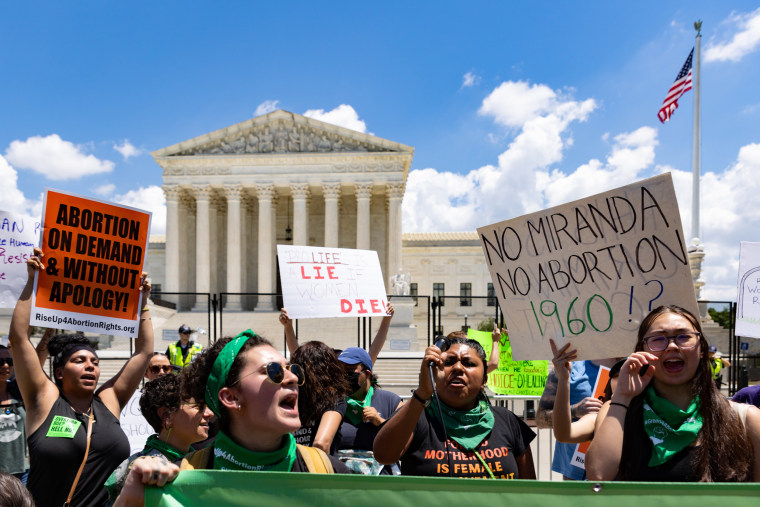American voters sealed Roe v. Wade's fate in November 2016, when they elected a Republican president and Senate majority who shifted the court to the right. Now with states free to pass laws restricting access to abortion, they'll have the opportunity to litigate the issue — in thousands of races at every level of government.
From high-profile governor races to typically overlooked contests for local prosecutors and state judges, voters will get a chance to influence which abortion laws are passed, how they're enforced, and whether they're upheld by courts. Here's a sample of how the issue is playing out across the country and some of the key races in November -- and beyond -- that could have a decisive impact.
House and Senate
Democrats are pledging to use their majorities to pass legislation codifying abortion rights should they win in November. In the Senate, Republicans currently are able to block any legislation with just 40 votes and Democrats Kyrsten Sinema, D-Ariz. and Joe Manchin, D-W. Va. oppose changing the rules to allow an up-or-down vote. With two more seats, however, Democrats could potentially eliminate the filibuster and pass a bill. Republicans in the House and Senate are debating whether to pursue a national abortion ban, which some prominent figures, like former Vice President Mike Pence, have called for.
Governors
The Supreme Court sent abortion laws to the states and that makes governors the most critical players in deciding what happens next. In Pennsylvania, for example, a victory by Democratic Attorney General Josh Shapiro would preserve abortion access, while a victory by Republican Doug Mastriano, who favors a total abortion ban with no exceptions, would likely lead to new restrictions from the GOP legislature.
State legislators
State legislators passed the abortion bans now going into effect, and they can undo them as well. The same goes for laws protecting access to abortion. That makes them the frontline of abortion fights around the country. In North Carolina, Republicans could plausibly win veto-proof majorities in November that would allow them to bypass Democratic Governor Roy Cooper to enact a strict abortion ban.
Attorneys general
The top law enforcement officials in the land are now tasked with enforcing new restrictions on abortion in dozens of states, and some are already pledging not to do so. They also will play a role in future lawsuits that will help define the limits of the Supreme Court's decision in Dobbs, both inside their states and nationally. In Michigan, Democratic Attorney General Dana Nessel, who has talked about her own abortion, has pledged not to enforce a pre-Roe ban from 1931 if it goes into effect (it's currently tied up in the courts). Her Republican opponent Matt DePerno favors an abortion ban with no exceptions for rape or incest and would encourage prosecutors to take up cases.
Local prosecutors
While state attorneys general are the top law enforcement officials, many of the biggest practical decisions will be made by prosecutors further down the line. In Arizona, the Maricopa County attorney's race will determine who implements the state's new abortion laws in a jurisdiction of 4.5 million people. The Democrat in the race, Julie Gunnigle, has said she would not enforce the state's 15-week ban, which could potentially be made more restrictive by the legislature. The ban does not include exceptions for rape and incest and Republican incumbent Rachel Mitchell has said she will not prosecute those cases even as she upholds the broader ban.
Local government
Mayors and city councils will also play a role in enforcing the law and candidates in states with bans are looking for ways to resist the new laws. Council members in places with permissive abortion laws, like the District of Columbia, are looking at bills to expand access to non-residents seeking abortions and prevent agencies from aiding investigators from other states looking into violations of their abortion bans.
Judicial races
The Supreme Court ruled that there is no Constitutional right to abortion, but there are other courts and other constitutions who get to weigh in as well. Citizens are voting on judges in 32 states in some capacity in 2022. In some states, like Minnesota and Kansas, judges have previously ruled that a right to abortion exists in their state constitution. In Kansas, voters can choose whether to retain two of the judges behind the decision in November. The issue will also raise the stakes for judicial elections in states like Ohio, Wisconsin, Michigan, North Carolina, Texas, and Georgia for years to come and add a new dimension to gubernatorial races in states where judges are appointed.
Ballot initiatives
In the most immediate test vote after the Dobbs decision, Kansas voters will get a chance to amend their state constitution on August 2 to allow legislators to restrict abortion, which would effectively overturn a 2019 state court ruling that Kansans have a right to abortion. In Michigan, groups that favor abortion rights are gathering signatures for a ballot initiative that would guarantee access to abortion and end the current confusion over whether a pre-Roe abortion ban will go into effect. Kentucky also has a vote on an amendment allowing abortion bans, while Vermont and California will let voters decide on amendments that would codify abortion rights.

